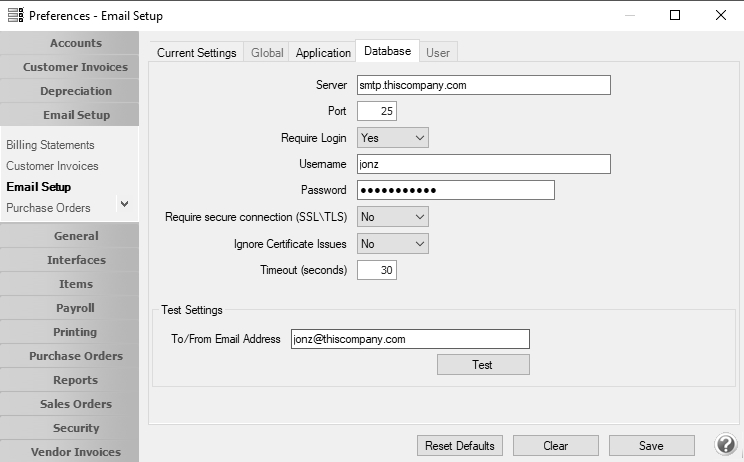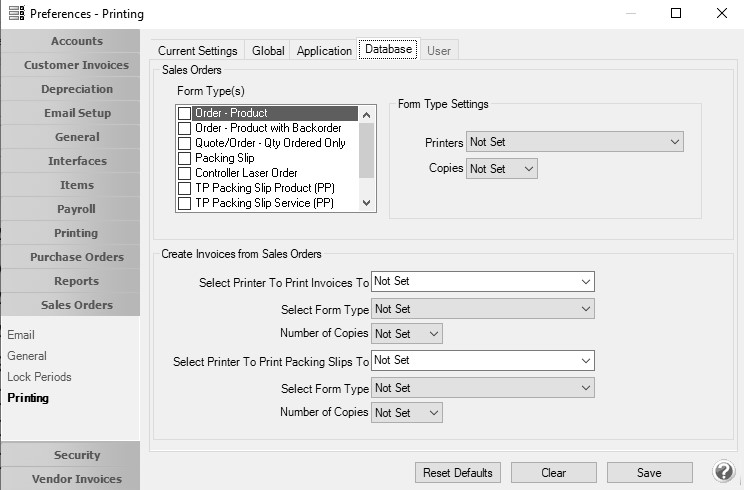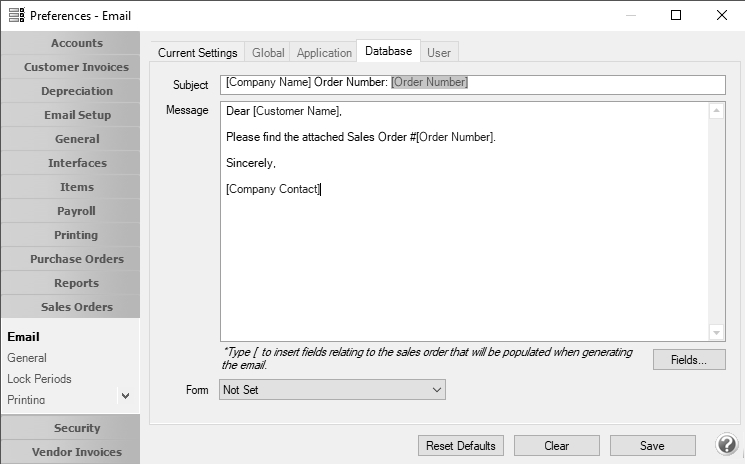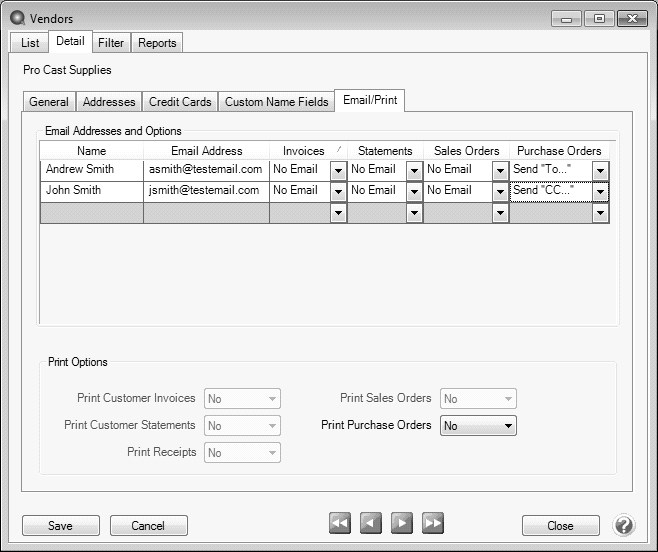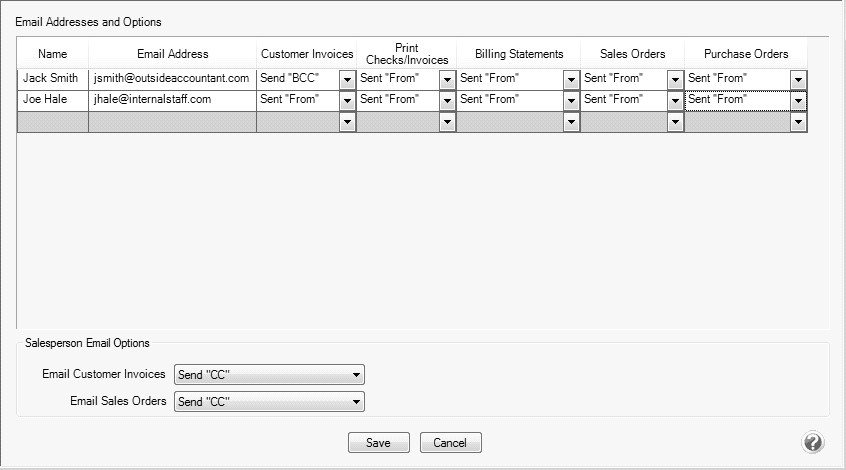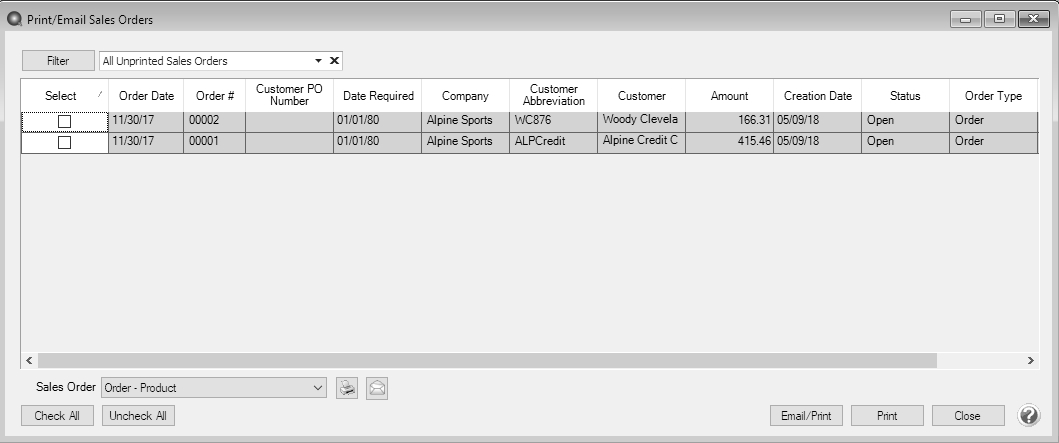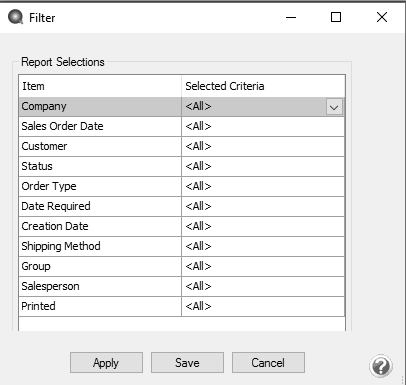CenterPoint® Accounting
- Print or Email Sales Orders
Related Help
_24.jpg) Enter a Sales Order or Quote Video - Duration: 22 min 12 sec
Enter a Sales Order or Quote Video - Duration: 22 min 12 sec
_24.jpg) Sales Order Quick Entry Video - Duration: 15 min 14 sec
Sales Order Quick Entry Video - Duration: 15 min 14 sec
_24.jpg) Convert a Quote to a Sales Order Video- Duration: 9 min 52 sec
Convert a Quote to a Sales Order Video- Duration: 9 min 52 sec
_24.jpg) Fill and Unfill Sales Orders Video - Duration: 13 min 12 sec
Fill and Unfill Sales Orders Video - Duration: 13 min 12 sec
_24.jpg) Invoice Filled Sales Orders Video - Duration: 15 min 18 sec
Invoice Filled Sales Orders Video - Duration: 15 min 18 sec
_24.jpg) Print or Email Sales Orders Video - Duration: 11 min 55 sec
Print or Email Sales Orders Video - Duration: 11 min 55 sec
CenterPoint allows you to email your sales order at the time you save the transaction entry. The sales order will be attached to an e-mail as a PDF file using the selected form design.
Step 1: One Time Setup of Email and Printing Preferences
Step 2: Define a Default Subject and Message for Emailed Sales Orders (Optional Setup)
Step 3: Customer Email/Print Defaults
Step 4: Sent From and Optional E-mail Addresses
Step 1: One Time Setup: Email and Printing Preferences
Email Setup
- Select File > Preferences > Email Setup > Email Setup.
- Select the Database tab at the top.
- Enter your “To/From” Email Address. This is the email address used only for testing the SMTP settings. The Sent From address for sales orders is set in Setup > General > Email Addresses, see Step 4 for more information.
- Once the To/From Email Address is entered, the system will try to auto fill the Server and Port. If it's unable to fill the info, you'll have to get the information from your network administrator. They can also let you know what you should select in the Require Login and Require secure connection (SSL\TLS) field.
- Click Test. An e-mail will be sent indicating the SMTP options have been set correctly. Verify that you received the CenterPoint: Testing SMTP Configuration email. See the Email Setup topic for additional information.
Note: If you didn't receive the email, then the settings in step 4 must be corrected.
- Once the email is received, select Save in the Preferences screen.
Sales Order Printing Preferences
Defines the form type(s) to use when printing sales orders, printer used to print sales orders and other selected form types, and the number of copies that will print when you choose to print sales orders and other form types.
- Select File > Preferences > Sales Orders > Printing.
- Select the Database tab at the top.
- Under Form Type, all available sales order form types will display with System Default automatically selected (if you use Setup > Forms Designer >Sales Order Form Designer, you can create a new sales order form type.). The sales order form type can be overridden in Processes > Sales > Sales Orders. Select all forms that you want to print when a sales order is printed. Highlight the form type(s) you selected and then under Form Type Settings, set the following options:
- Printers- Select the printer to print the selected form type to. Setting this at the database level allows a different printer for each database.
- Copies - Select the number of copies to print of the selected form type.
-
Under Create Invoices from Sales Orders, the invoice settings below are used when invoices are created, posted, and printed from sales orders .
- Select Printer To Print Invoices To - Select the printer to print the invoices to. Setting this at the database level allows a different printer for each database.
- Select Form Type - Select the invoice form from the drop-down list. If you use Setup > Forms Designer > Invoice Forms Designer, you can create a new invoice form type that can be set here to be used as the default invoice form type.
- Number of Copies to print when you select to print invoices.
- Select Printer To Print Packingt Slips To - Select the printer to print the packing slips to. Setting this at the database level allows a different printer for each database.
- Select Form Type - Select the packing slip form from the drop-down list.
- Number of Copies to print when you select to print packing slips.
- Click Save.
Step 2: Define a Default Subject and Message for Emailed Sales Orders (Optional Setup)
If you'd like to use the same e-mail Subject, Message, and Form each time you email a sales order, it can be added to this preference. This preference also allows you to add Form Fields from the sales order data to the default Subject line or Message text.
- Select File > Preferences > Email > Sales Orders.
- Select the Database tab at the top.
- Enter a default Subject and Message.
- If you want to insert Form Fields into the Subject or Message of the email, click the Fields button at the location the form field should be inserted. The available Form Fields for sales orders are:
| Company Address 1 |
Company Address 2 |
Company City, State, Zip |
Company Contact |
Company |
| Company Name |
Company Phone |
Company Web Address |
Custom 1-8 | Customer Abbreviation |
| Customer Name | Memo 1 | Memo 2 | Order Date | Order Number |
| Order Total | Payment Terms | Payment Terms Abbreviation |
Shipping Method Abbreviation |
Shipping Method |
-
For example, you can customize the default Subject and Message for emailed sales orders to include data fields from the sales order data along with default text:
-
In the Subject box, click Fields, select Company, type Order Number:, click Fields or type [, and then select Order Number.
- In the Message box, type Dear,click Fields or type [, select Customer Name, and then type a comma.
- In the Message box, type Please find the attached Sales Order#,click Fields or type [, select Order Number, and then type a period.
- In the Message box, type Sincerely,.
- In the Message box, click Fields or type [, select Customer Contact.
-
Note: To create paragraphs, press your Ctrl and Enter keys at the same time.
- Select a default Form for emailing sales orders. This form will be used to format the PDF file that will be attached to the email.
- Click Save.
Step 3: Customer Email/Print Defaults
Prior to e-mailing a sales order to a customer, the customer file must include an email address and e-mail form options on the Email/Print tab.
- Select Setup > Names or Setup > Customers.
- Find the appropriate customer and click Edit.
- Click on the Email/Print tab. The Email Addresses and Options fields that are active will depend on the modules that you have purchased and registered and if the name is a vendor a customer. Use these options to set up multiple email addresses where invoices, statements, sales orders, and purchase orders can be sent for this customer. You can also select how each email is to be sent, No Email, Send "To..." (directly to the recipient), Send "CC..." (as a carbon copy), or Send "BCC..." (as a blind carbon copy, for example, the person sending the email may want to enter their own email address so they have an audit trail of emails sent ). The Email Addresses and Options settings will be used to set the default image on the Email button on the Customer Invoices (Basic), Customer Invoices (Detail), Receipts, Sales Orders and Purchase Orders entry screens. An envelope image with a check mark on it will mean the form will be emailed and an Envelope image with a cross-through on it will mean the form will not be emailed.
The Print Optionsfields that are active will depend on the modules that you have purchased and registered and if the name is a vendor a customer. The available fields are: Print Customer Invoices, Print Customer Statements, Print Receipts, Print SalesOrders, and Print Purchase Orders. Use these options to determine if invoices, statements, sales orders, and purchase orders should be printed for this vendor. The Print Options settings will be used to set the default image on the Print button on the Customer Invoices (Basic), Customer Invoices (Detail), Receipts, Sales Orders and Purchase Orders entry screens. A printer image with a check mark on it will mean the form will Print and a Printer image with a cross-through on it will mean the form will not print.
- Click Save.
Step 4 - Sent From and Optional Email Addresses
The Setup > General > Email Addresses menu selection is used to set the name and email address purchase orders are sent from. This menu allows you to select other Sent From email address for the different forms that you send via email.
You can optionally add email addresses where messages and attached documents can be sent to; including internal staff, outside accountants, or other addresses that are not related to the vendor the transaction is entered for. You can also select how each email is to be sent, directly to the recipient, as a carbon copy, or as a blind carbon copy or set a default "From" email address for each document.
- Select Setup > General > Email Addresses.
- Enter the Name, the Email Address, and select how Sales Orders should be sent, No Email, Send "From..." (the default e-mail address the purchase order is sent from), Send "CC..." (as a carbon copy), or Send "BCC..." (blind carbon copy).
Step 5 - Printing or Emailing a Sales Order During Entry
When entering sales orders, the Print and Email icons will display the defaults for the selected customer. For example, if you have a customer setup to email only, the Print icon will display a red X on it and the Email icon will have a green check mark on it.
- If a customer is setup to email their sales orders, the system will automatically prompt you to email the sales order when the sales order is saved.
- You can change the print or email settings for a customer from the sales order entry screen by simply clicking on the Print or Email icons. If you click on the Email icon, the settings from the Email/Print tab in Setup > Customers or Setup > Names displays. You can add additional recipient e-mail addresses to the To, CC, or BCC boxes by separating the addresses with a semi-colon. You can also change the form the sales order should be printed on.
- If you attached documents to a sales order (for example pictures of a product, specifications of a product, warranty information, etc),. you can email the attachments with the sales order. See the Attach Documents to Transactions topic for detailed information
- Use the Print/Email Sales Orders screen to email a group of sales orders.
Step 6 - Printing or Emailing Multiple Sales Orders
- Select Processes > Sales > Sales Orders > Print/Email Sales Orders
- All unprinted sales orders will display, but the filter can be changed to display all unprinted quotes. If you would like to filter the list of sales orders that display, click the Filter button, select your filter criteria, and either Apply the filter to the list (you will see Custom in the Filter box) or Save the filter so you can select the named filter in the Filter box.
- To select all sales orders for printing, click Check All or select each sales order you want to print. To unselect all sales orders from the printing selection, click Uncheck All.
- Select the Sales Order form type.
- Click the Printer icon to select the printer and the number of copies to print.
- Click the Envelope icon to change the defaults set in File > Preferences > Email > Sales Orders for the Subject, Message, and Form.
- Click Email/Printto email and/or print all selected sales orders or click Print to print all selected sales orders. Sales orders will be printed and/or emailed based on the selections made for the customer in Setup > Customers or Setup > Names.
- Verify or change your Email Settings.
- Click OK.
- You will receive a Process Completed Successfully message when the sales order is e-mailed.
- Click Close.
|
Document: 3240 |
|---|

